July 6, 2023
Thesaurus : 08. Juridictions du fond
► Référence complète : TJ Paris, 5ème chambre, 2ème section, ordonnance du juge de la mise en état, 6 juillet 2023, n° RG 22/03403, TotalÉnergies
____
____
📝commentaires de la décision :
- Dalloz actualité, 13 juillet 2023, obs. J.-B. Barbièri & A. Touzain
- Rev. sociétés, 2023, p.793, obs. A. Danis-Fatôme & N. Hoffschir
- Gaz. pal., 19 septembre 2023, n° 29, n°GPL453l6, pp. 2-3, note V. Mazeaud
- Bull. Joly, novembre 2023, n° BJS202m8, pp. 17-19, note E. Schlumberger
________
June 28, 2023
Thesaurus : Soft Law
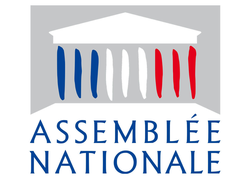
► Référence complète : Assemblée Nationale, Rapport d'information sur le devoir de vigilance des entreprises en matière de durabilité, déposé par la Commission des affaires européennes, présenté par Madame la députée Sophia Chikirou et Madame la députée Mireille Clapot, 28 juin 2023.
____
________
June 19, 2023
Conferences
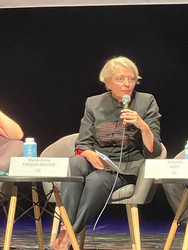
♾️ follow Marie-Anne Frison-Roche sur LinkedIn
♾️subscribe to the Newsletter MAFR Regulation, Compliance, Law
____
► Full Reference: M.-A. Frison-Roche, participation in the panel "Vigilance (due diligence)", in International Law Association (ILA), 150th Anniversary Symposium of the ILA/ADI, Paris, 19 June 2023.
____
🧮See the full programme of this event
________
June 14, 2023
Conferences
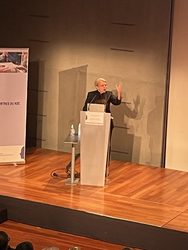
🌐follow Marie-Anne Frison-Roche on LinkedIn
🌐subscribe to the Newsletter MAFR Regulation, Compliance, Law
____
► Full Reference: M.-A. Frison-Roche, "L'esprit des Lois en matière de vigilance" ("Spirit of Law in Vigilance (Due Diligences) matters"), in Haut Conseil du Commissariat aux Comptes (H3C), Réalités et défis de la CSRD - Perspectives du devoir de vigilance, Paris, 14 June 2023.
____
🎥watch the video of a part of the speech (in French)
____
🧱read the description of the speeches of other speakers of this panel (in French)
____
The speech took place during the third-round table devoted to the Perspectives du devoir de vigilance (Perspectives of the duty of vigilance), the first round table having been devoted to the lessons that the DPEF can provide for the CSRD, and the second to the transposition work of the CSRD.
🧮See the full programme of this annual event (in French)
____
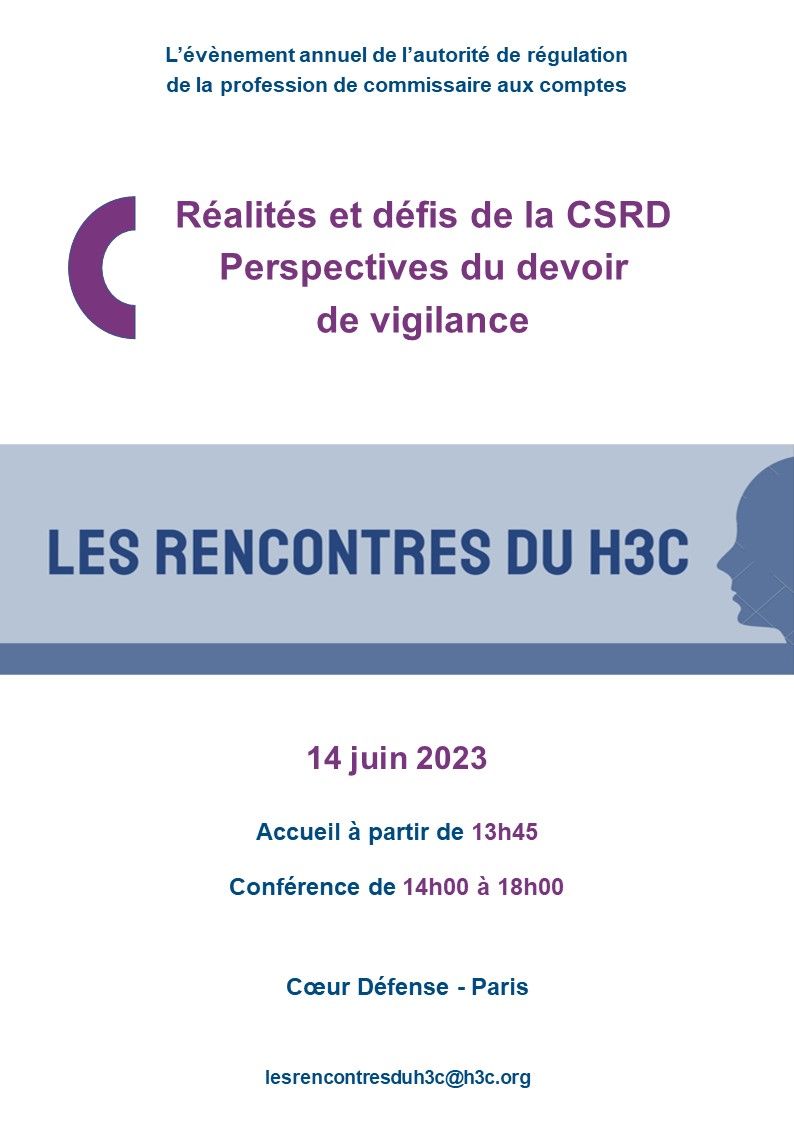
► English summary of the speech: In consideration of and in addition to what has been said, explained and even affirmed by other speakers, I have emphasised that 'vigilance" laws is not a 'regulation' like any other, but the leading edge of a very vast movement, Compliance Law, in which the 2017 French law is the driving force. For its application, the Judge, who is at the centre because of the will of the Legislator, is already taking into consideration the CS3D, the twin text of the CSRD.
The texts must not be seen in isolation. If we isolate them from each other, they become almost incomprehensible, their meaning appearing uncertain, even threatening: we need to understand the spirit of these texts, which are indeed new, because they aim to provide answers to the new world we have entered. We must all rejoice in this political ambition, which is taking a legal form, and work to make it efficient: Legislators, companies, auditors, Regulators and Judges.
If we do not stop at the letter, which would be to reduce Compliance to conformity, whereas Compliance Law, particularly Vigilance, is the extension of Regulation, finds its meaning in the Goals, we see that the French law of 2017, known as the "Vigilance law", which copies all the techniques of the French law known as "Sapin 2", gives goals simple to understand to the companies subject to the Legislator's will: detect and prevent environmental and human rights abuses in the value chains.
The logic is therefore Ex-Ante.
This Ex-Ante logic is retained by the CS3D directive.
The Judge is central to it. But the responsibility which the NGOs will ask him to trigger is itself an "Ex Ante responsibility", the Compliance trials being like "accountability" trials, to ensure that companies act in accordance with the Goals set by the Legislator.
This is transforming the role of the Judge, who must find effective solutions for the future. The discussion and the adversarial principle will become more important. Mediation will be encouraged. Stakeholders and the company will have to work together, and this method, which was intended by the Legislator for drawing up the vigilance plan, will be continued in the supporting legal proceedings.
This will also transform the company, and the role played by those who accredit the information on the company's actions and long-term strategies: auditors therefore have a central role to play.
________

June 13, 2023
Organization of scientific events
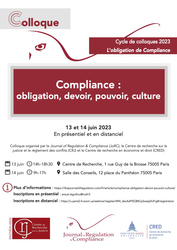
► Référence complète : B. Deffains, M.-A. Frison-Roche et J.-B. Racine (dir.), Journal of Regulation & Compliance (JoRC), Centre de recherche sur la justice et le règlement des conflits (CRJ) et Centre de recherche en économie (CRED) de l'Université Paris Panthéon-Assas (Paris II), Compliance : Obligation, devoir, pouvoir, culture, Université Paris Panthéon-Assas, 13 et 14 juin 2023.
____
🏗️Ce colloque s'inscrit dans le cycle de colloques organisé par le Journal of Regulation & Compliance (JoRC) et ses Universités partenaires, portant en 2023 sur le thème général de L'Obligation de Compliance.
____
📚Les travaux s'inséreront ensuite dans les ouvrages :
📕L'obligation de Compliance, à paraître dans la collection 📚Régulations & Compliance, coéditée par le Journal of Regulation & Compliance (JoRC) et Dalloz, publié en langue française.
📘Compliance Obligation, à paraître dans la collection 📚Compliance & Regulation, coéditée par le Journal of Regulation & Compliance (JoRC) et Bruylant, publié en langue anglaise.
____
► Présentation générale du colloque : "L'obligation" est au cœur de bien des disciplines. Les techniques de compliance prennent très souvent la forme d'obligations. Mais pour ne mentionner que les premières interrogations qui viennent à l'esprit et dans les cas, notamment ceux qui sont posés aux juridictions, c'est paradoxalement assez peu le "Droit des obligations" qui a été utilisé, le Droit de la Compliance étant d'une part assez souvent assimilé à la "réglementation", et son unilatéralité, comme le fût le Droit de la Régulation, branche du Droit qu'il prolonge, d'autre part on lui a souvent associé l'éthique, la morale, une culture partagée, tout ce qui semble mettre en distance de l'obligation. Les notions de "devoir" et d'"engagement", prennent de plus en plus place dans le Droit de la Compliance, avec une portée encore incertaine. C'est pourquoi, au-delà de la multiplicité des "obligations de compliance", l'on peut se demander s'il existe une "obligation de compliance", quelle serait sa définition et son rapport avec tout ce qui, dans le Droit de la Compliance, ne serait pas une obligation.
____
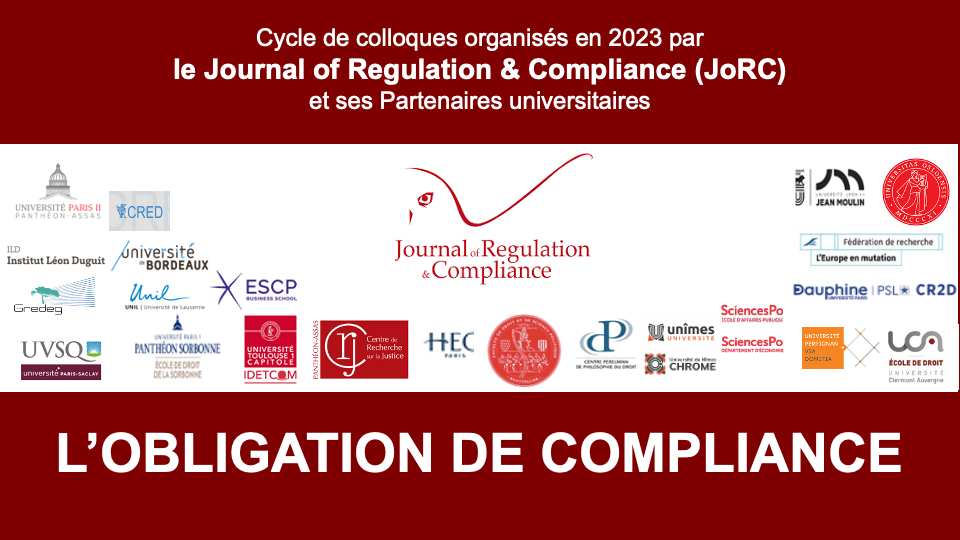
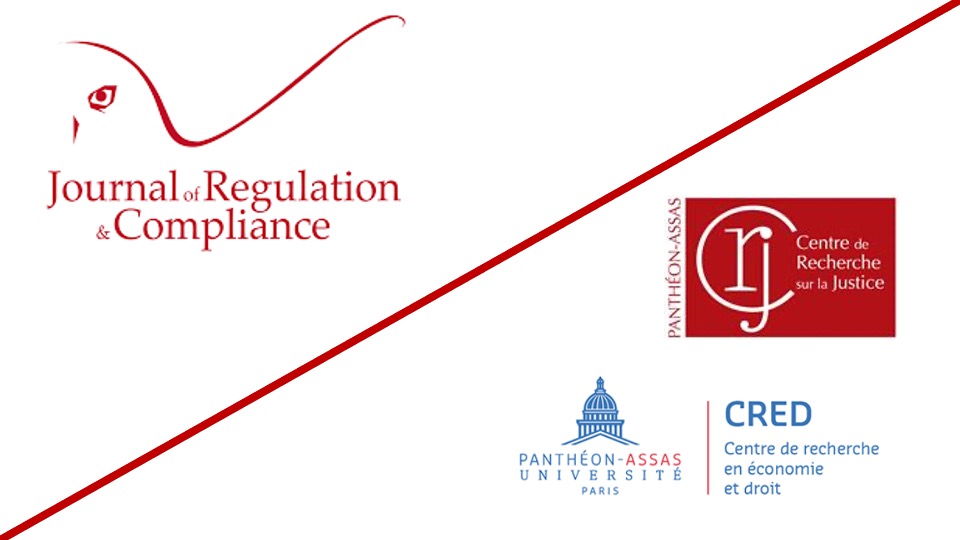
____
► Interviennent :
🎤Jean-Sébastien Borghetti, professeur à l'Université Panthéon-Assas (Paris II)
🎤Louis d'Avout, professeur à l'Université Paris Panthéon-Assas (Paris II)
🎤Bruno Deffains, professeur d'économie du Droit, Université Panthéon-Assas (Paris II)
🎤Marie-Anne Frison-Roche, professeur de Droit de la Régulation et de la Compliance, directrice du Journal of Regulation & Compliance (JoRC)
🎤Daniel Gutmann, professeur à l'Ecole de Droit de l'Université Panthéon-Sorbonne (Paris I)
🎤Anne-Valérie Le Fur, professeure à l'Université Paris-Saclay
🎤Gilles Lhuilier, professeur à l'ENS de Rennes, directeur du département Droit, Economie, Gestion
🎤Etienne Maclouf, professeur en sciences de gestion à l'Université Panthéon-Assas (Paris II)
🎤Jean-Baptiste Racine, professeur de Droit, Université Panthéon-Assas (Paris II)
🎤René Sève, directeur de l'Association française de philosophie du droit (AFPD) et des Archives de Philosophie du Droit (APD)
🎤Marta Torre-Schaub, directrice de recherches au CNRS, Institut des sciences juridique et philosophique de la Sorbonne, Université Panthéon-Sorbonne (Paris I)
____
Lire une présentation détaillée de la manifestation ci-dessous⤵️
June 6, 2023
Newsletter MAFR - Law, Compliance, Regulation
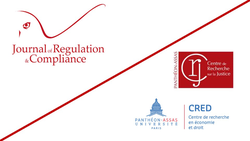
♾️suivre Marie-Anne Frison-Roche sur LinkedIn
♾️s'abonner à la Newsletter MAFR Regulation, Compliance, Law
____
► Référence complète : M.-A. Frison-Roche, "Compliance : obligation, devoir, pouvoir, culture (colloque 13 et 14 juin 2023)", Newsletter MAFR Law, Compliance, Regulation, 6 juin 2023.
____
📧Lire par abonnement gratuit d'autres news de la Newsletter MAFR - Law, Compliance, Regulation
____
🔴 Comprendre l'Obligation de Compliance afin d'en maîtriser la pratique (colloque des 13 et 14 juin 2023 du Journal of Regulation & Compliance (JoRC), du Centre de recherche sur la justice et le règlement des conflits (CRJ) et du Centre de recherche en économie et droit (CRED) de l'Université Paris Panthéon-Assas).
La compliance parait inmaîtrisable dans sa diversité et son ampleur et l'on doute parfois de sa juridicité.
Pour favoriser la maîtrise de cette pratique et construire le Droit de la Compliance, il est essentiel de mieux cerner l'Obligation de compliance.
C'est l'objet de ce colloque.
____
📧lire l'article ⤵️
May 25, 2023
Conferences

♾️ flollow Marie-Anne Frison-Roche on LinkedIn
♾️subscribe to the Newsletter MAFR Regulation, Compliance, Law
____
► Full Reference: M.-A. Frison-Roche, "Conclusions", in Ch. Maubernard et A. Brès (dir.), Institut de droit européen des droits de l'homme et Centre de droit de l'entreprise, Université de Montpellier, Le devoir de vigilance des entreprises : l'âge de la maturité?("The Entreprises duty of vigilance: the maturity age?") , Montpellier, May 25, 2023.
The conference is held in French.
____
🧮see the manifestation programme (in French)
___
🌐 read the report done on LinkedIn (in French)
___
► English summary of this final speech of the manifestation: It is rather difficult to draw a conclusion after listening so many contributions. For three reasons: firstly, because of their richness and extreme diversity; secondly, because of the fact that we do not know whether the duty of vigilance is under the French law of 2017 (known as the Vigilance Law) or in other national, European and international texts or beyond or below the legal rules; thirdly, because we do not know what is meant by the "maturity" of a legal concept. But in the end, since the question posed by the title itself of the colloquium is Duty of Vigilance: the age of maturity? the answer is clearly: no.
But this is regrettable. It is therefore essential to explore the ways in which the duty of vigilance can mature. If we find merit in this duty which has now entered the legal system, there are eight intersecting avenues, which must be exploited.
The first path is progression through the passage of time, rediscovering what in the past was already vigilance and what in the future will be its deployment.
The second way is to progress by fixing the vocabulary, because we are witnessing a great battle of words, overtly or covertly, in French or English.
The third path is progression through the emergence of principles, or even a principle, rediscovered or invented.
The fourth path is progression through coherence brought to the legal system(s), which at present suffer from gaps and inconsistencies, which could be remedied by methods such as centralising litigation or, more radically, ignoring borders.
The fifth path is progression through the fact that it works, because vigilance techniques are those of Compliance, of which vigilance is the leading edge, and the challenge is to find solutions.
The sixth path is progression through using power of the legal system not only to create new areas of relevance - starting with the notion of vigilance, but also that of the value chain - but also to impose new indifferences, namely indifference to the figure of the market (to which laws prefer the company and the value chain) and indifference to borders.
The seventh path is progression through bringing perspectives closer together, in order to find solutions even when interests are opposed. This is where the two techniques of contract and mediation are very welcome.
The eighth path is progression through culture, because the culture of vigilance, like the culture of compliance, must be developed within companies and supply chains, and must become common to them and their stakeholders.
____
________
May 17, 2023
Thesaurus : Doctrine
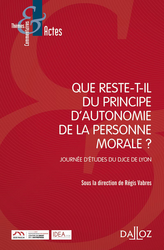
► Référence complète : Th. Favario, "Autonomie de la personnalité morale et devoir de vigilance", in R. Vabres (dir.), Que reste-t-il du principe d'autonomie de la personne morale ? - Journée d'études du DJCE de Lyon, coll. "Thèmes & Commentaires", Dalloz, 2023, pp.103-112.
____
► Résumé de l'article :
____
🦉Cet article est accessible en texte intégral pour les personnes inscrites aux enseignements de la Professeure Marie-Anne Frison-Roche
________
May 11, 2023
Adventures of the Ogre Compliance

► Référence complète : E. Piana, E. et P. Utho, L'Épervier Vigilance et le pays au nom oublié, 2023, Éditions du Journal of Regulation & Compliance (JoRC), coll. "Les Aventures de l'Ogre Compliance", 63 p.
____
🛒 cette collection est utilisée dans les structures pour diffuser une culture de compliance. Pour plus d'information, contacter le Journal of Regulation & Compliance
____
📚 Cet ouvrage est le deuxième de la collection créée par Marie-Anne Frison-Roche au sein du Journal of Regulation & Compliance (JoRC).
___
► Présentation de la collection : Sous la direction du professeur Marie-Anne Frison-Roche, le Journal of Regulation & Compliance (JoRC) publie de l’information technique sur le Droit économique, de la Régulation et de la Compliance. Parce que cette matière paraît souvent inaccessible, réservée aux spécialistes, mais aussi très ennuyeuse ! Marie-Anne Frison-Roche lance une collection : Les Aventures de l’Ogre Compliance.
Même un enfant peut y comprendre la lutte contre la corruption, le lancement d’alerte, les conflits d’intérêts, la gouvernance de l’espace digital, la protection de l’environnement, les techniques de règlements des différends. Mais pour cela, il faut affronter le terrible Ogre Compliance… Peut-être Beau Fifi viendra-t-il à l’aide du lecteur de tout âge ?
____
► Présentation de l'ouvrage par sa quatrième de couverture :
L'Épervier Vigilance a un regard magique : il voit tout, comme s'il était à côté de toute chose et de chacun.
Ce qu'il voit, l'Épervier Vigilance le raconte à son ami de toujours : Supérieur, qui, au dernier étage de la Haute et Grande Tour, fait fabriquer de merveilleux jouets.
Un jour durant son vol, Vigilance aperçoit au loin un étrange Pays dont nul ne se souvient du nom. L'enfant qu'il y découvre ne parle pas, occupé tout le jour et toute la nuit à couper du bois qui servira à fabriquer des jouets.
Comment raconter cela à Supérieur, qui l'attend pour dîner ? L'Ogre Compliance qui vit dans la Haute et Grande Tour va-t-il s'en mêler ? Et Supérieur, que fera-t-il quand il apprendra cela ?
► Les articles publiées :
►au regard de son innovation pédagogique :
📝lire
► au regard de son intimité entre le Droit et la Littérature :
📝 la r
► au regard de son apport dans le Droit économique :
Dans sa rrences dans ses Antitrust Compliance Awards au titre de son caractère innovant.
____
🎥 Regarder
____
► Quelques réactions personnelles à ce premier ouvrage de la Collection des Aventures de l'Ogre Compliance :
 💬 "J'ai jeté un regard distrait sur ce petit bouquin. Déjà que le précédent valait pas grand chose, mais au moins on y parlait de moi, le si attractif Crapaud Doré Corruption !
💬 "J'ai jeté un regard distrait sur ce petit bouquin. Déjà que le précédent valait pas grand chose, mais au moins on y parlait de moi, le si attractif Crapaud Doré Corruption !
Là, rien... une allusion peut-être, vu que j'arrive à me glisser partout.
Mais enfin la part belle est faite à un épervier vantard, qui dit qu'il pourrait tout voir ! et tout raconter ! Et ben ça me ferait bien rire, parce qu'avant de me dénicher, moi le Crapaud Doré Corruption et de m'empêcher par avance de faire ce que je veux...
Surtout dans Le pays au nom oublié !
Souvent pour moi et mes bons copains, c'est un petit coin de paradis ....
Lire quand même ci-dessous d'autres réactions car peut-être ne faut-il pas croire le Crapaud Doré Corruption : 🔻
anouk.leguillou@mafr.fr
01.53.59.98.31
May 8, 2023
Thesaurus : Soft Law
► Full Reference: Committee on Legal Affairs of the European Parliament, Report on the proposal for a directive of the European Parliament and of the Council on Corporate Sustainability Due Diligence and amending Directive (EU) 2019/1937, 8 May 2023.
____
________
May 3, 2023
Thesaurus : Doctrine
► Référence complète : L. Martinet, V. Rouer et L. Bocquillon, "Premiers jugements sur le fondement de la loi sur le devoir de vigilance des entreprises : le juge des référés entre pédagogie et (sur)interprétation", Actu-Juridique, 3 mai 2023.
____
► Résumé de l'article (fait par les auteurs) : Le 28 février 2023, le tribunal judiciaire de Paris s’est prononcé pour la première fois, en référé, sur l’application du devoir de vigilance issu de la loi n° 2017-399 du 27 mars 2017 dans une affaire relative au méga projet pétrolier mené par TotalEnergies et ses filiales en Ouganda et en Tanzanie, à la suite de l’assignation de différentes organisations non gouvernementales françaises et ougandaises. Cette affaire, la première du genre, s’inscrit dans la mise en œuvre d’une loi dont les députés français espéraient qu’elle «marque une rupture dans la mondialisation ».
____
🦉Cet article est accessible en texte intégral pour les personnes inscrites aux enseignements de la professeure Marie-Anne Frison-Roche
________
April 18, 2023
Newsletter MAFR - Law, Compliance, Regulation

♾️ follow Marie-Anne Frison-Roche on LinkedIn
♾️ subscribe to the Newsletter MAFR Regulation, Compliance, Law
____
► Full Reference: M.-A. Frison-Roche, "Pour un consommateur "vigilant" : l'éduquer. Analyse juridique" ("For a "vigilant" consumer: educate him. Legal analysis"), Newsletter MAFR - Law, Compliance, Regulation, 18 April 2023.
____
📧Read by freely subscribing other news of the Newsletter MAFR - Law, Compliance, Regulation
____
🔴For an efficient Compliance Law: an Ex Ante responsibility in alliance with consumer expectations
A survey confirms that consumers integrate the monumental goals that generate compliance duties and obligations on the companies that sell them products. But this does not create a duty on them to prefer these products over others: they do not feel "responsible" for them. Compliance Law is based on ex ante responsibility and shared duty. So, faced with this attitude, what can the Law do?
____
📧read the article ⤵️
April 6, 2023
Newsletter MAFR - Law, Compliance, Regulation

🌐 follow Marie-Anne Frison-Roche on LinkedIn
🌐 subscribe to the Newsletter MAFR Regulation, Compliance, Law
____
► Full Reference: M.-A. Frison-Roche, "La "rationalité délibérative" et l'usage adéquat de l'impératif de vigilance" (""Deliberative rationality" and the proper use of the vigilance imperative"), Newsletter MAFR - Law, Compliance, Regulation, 6 April 2023.
____
📧Read by freely subscribing other news of the Newsletter MAFR - Law, Compliance, Regulation
____
🔴The deliberative public space, a model method for the implementation of the duty of vigilance
In this new article of April 6, 2023 of the Newsletter MAFR - Law, Compliance, Regulation, the political philosophy construction that Habermas exposes about social networks and the method that the implementation of the duty of vigilance requires are correlated. Indeed, Habermas continues to advocate a space for discussion, contradiction, deliberation, opinion that can act with rationality. Communication and mediation are essential to ensure that the future, which is the object of vigilance, will not be a catastrophe: this monumental goal of compliance, of which Vigilance is a part, implies it.
____
📧read the article ⤵️

March 25, 2023
Publications

🌐 follow Marie-Anne Frison-Roche on LinkedIn
🌐subscribe to the Newsletter MAFR Regulation, Compliance, Law
🌐subscribe to the Video Newsletter MAFR Surplomb
____
 ► Full reference: M.A. Frison-Roche, Vigilance, a piece of the European puzzle, Working Paper, March 2023.
► Full reference: M.A. Frison-Roche, Vigilance, a piece of the European puzzle, Working Paper, March 2023.
____
🎤This Working Paper has been done as was made the conclusion of the colloquiul La société vigilante ("Vigilant Company") at the Aix-Marseille University on March 24, 2023 (conference given in French)
____
📝It is also the basis of the article that introduces a special issue on La société vigilante
____
► Summary of this Working Paper: The contributions form a contrasted whole. It should not be concluded that some of them are correct and others false: through the reading that each one makes of the so-called French 2017 "Vigilance law," it is a vision of the world as it should be that each author proposes. Because Compliance Law, which Vigilance is a part, claims to draw the future, it is normal that each author should draw the present Law with a hand that bends in one direction or the other, following their conception of the future world. The whole contributions must be seen as a dialogue.
A lively dialogue, with this French 2017 law receiving a lot of "glory" and a lot of "indignity" on both sides, from which it is necessary to emerge in order to find solutions, because it is a fundamental movement of which this law is only a gateway (I). Whatever one thinks of it, it is all the branches of law that are used, affected, and transformed by Vigilance (II). To master this profound transformation, we must turn to Europe, to the great puzzle of texts recently adopted or in the process of being adopted in the European Union, of which Vigilance is the hallmark (III).
____
🔓read the Working Paper⤵️

March 24, 2023
Publications

► Référence complète : M.-A. Frison-Roche, notes prises pour faire le rapport de synthèse du colloque de La société vigilante, 24 mars 2023.
____
► Méthode : En raison de la richesse et la diversité des propos tenus, pour tenir le temps imparti, des passages n'ont pas été repris à l'oral.
Parce qu'il s'agit d'une synthèse, le document ne s'appuie que sur les propos tenus et n'est pas doté de références techniques, ne renvoyant pas non plus à des travaux personnels.
____
► Articulation des notes prises au fur et à mesure de l'écoute des différentes interventions des orateurs successifs :
____
🔻Lire les notes prises d'une façon exhaustive ci-dessous.
March 24, 2023
Conferences
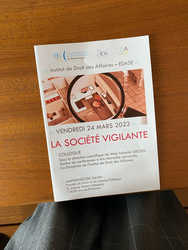
♾️ follow Marie-Anne Frison-Roche on LinkedIn
♾️subscribe Newsletter MAFR Regulation, Compliance, Law
____
► Full Reference: M.-A. Frison-Roche, "Propos introductifs : Les buts monumentaux de la vigilance" (Introductory remarks: The Monumental Goals of Vigilance), in La société vigilante ("The Vigilant Company"), Aix-Marseille University, Institut de Droit des Affaires, March 24, 2023.
____
This conference is done in French; read its English Summary below⤵️
🧮see the complete program of the manifestation (in French)
____
► English Summary of the conference: "Vigilance" is intriguing because, although it occurs in many branches of Law and is familiar in "banking compliance", in a form that is moreover reinforced since it is an obligation of vigilance on the part of the banker about a client whom he/she should "know", it is the "duty of vigilance" that made this notion famous. One could almost say scandalously famous because of a French law of 2017 that now bears its name, called the "Vigilance Law", whereas other laws bear the name of the minister who thought of it, which due diligence (vocabulary used for the European directive) does not erase.
The current challenge is to take the right measure of what "vigilance" is.
Vigilance goes beyond the French Loi Vigilance, which is not enough to express what it is in its few dispositions. To say what it is in the legal system, to use it in practice, to propose the intellectuel legal exercice of qualification, Vigilance must be thought of in Compliance Law, of which it is both a "Tool" and the most advanced point, as shown by the European Directive, whose discussions during its elaboration show these design issues.
Thus, like the whole of Compliance Law, Vigilance is understood, deployed, analysed and exercised through what underpins and gives meaning to all these constantly changing regulations, powers, and obligations, through Compliance Monumental Goals which give it stability and simplicity. This is the least that can be done in a mechanism that has the ambition to organise the "sustainability" of economic relations.
But while Vigilance expresses and concretizes Compliance Monumental Goals, it must not go beyond measure.
In fact, to set up structures, use tools and behave in such a way that human rights and nature are effectively and extraterritorially protected, both negatively and positively, these obligations of the company, which is the natural subject of the "duty", more generally the natural subject of Compliance Law, see its legal powers increased, these means being required for the company to fulfil its new obligations, first legal, then contractual, soon to be unilaterally formulated.
Perhaps we should conceive of a "vigilant company" and not just a company that, beyond and through its economic activity, cares for others and the world, but a company that "watches over" everything and on everything would be to go beyond the measure, to make companies the "regents" of the world and the people who live in it.
Faced with this perspective to be excluded, the construction of a Europe of Compliance, which does not be reduced to corruption fighting or environment protection, and draws on its humanist tradition, distinguishing itself in this respect from the American and Chinese compliance systems, is the major challenge.
Companies are not the alpha and omega, but they are one of the elements of an Alliance between the political Authorities and the population, its link, the one that allows us to escape from the limit of the territory, in what we call by this inadequate term of "extraterritoriality". It is rather a question of going beyond territories, required by the Compliance Monumental Goals of Compliance, of which Vigilance is the advanced point.
____
🚧read the English Working Paper, basis of this conference: "Vigilance, Compliance Monumental Goals, and "Vigilant Company""
____
📈see the slides created for this conference (in French)
____
📝read the article published after this conference
________
March 24, 2023
Conferences

♾️ suivre Marie-Anne Frison-Roche sur LinkedIn
♾️s'abonner à la Newsletter MAFR Regulation, Compliance, Law
____
► Référence complète : M.-A. Frison-Roche, "synthèse", in I. Grossi (dir.), La société vigilante, Université d'Aix-Marseille, Institut de Droit des Affaires, 24 mars 2023.
____
____
🧮Consulter le programme complet de cette manifestation
____
Cette réflexion finale a servi de base à un article ; La vigilance, pièce du puzzle européen. Lire le document de travail sous-jacent.
____
► Présentation de la synthèse : La synthèse du colloque a été réalisée sur le vif, à partir des notes prises au fur et à mesure du déroulement de la journée. L'écoute des uns et des autres a fait ressortir 4 points qu'il aurait été difficile d'isoler dans une partie du droit positif, parce qu'il a été manifeste que les propos ont porté parfois sur la Compliance, parfois sure l'obligation de vigilance, parfois sur le devoir de vigilance et le plus souvent sur la loi du 27 mars 2017, laquelle a donc servi de porte d'entrée à l'ensemble des réflexions. Mais elle n'a été qu'une porte d'entrée.
Le premier point est justement l'impression d'une ampleur de tantôt de "gloire" et tantôt d'"indignité" qui ont été déversées sur cette loi Vigilance. Les intervenants ont donc fortement divergé.
Le deuxième point est l'impression à l'inverse générale et commune, pour que les orateurs s'en félicitent, s'en inquiètent, s'en réjouissent ou s'en effondrent, d'un grand mouvement auquel nous assistons et que la Vigilance traduit ou/et porte.
Le troisième point est la multiplicité des branches du Droit qui sont utilisées ou touchées, là encore qu'on s'en réjouisse ou pas, et la nécessité de dépasser ces branches du Droit. Face à la Vigilance, des disciplines peuvent apparaître en opposition, tandis que des branches du Droit semblent entrer comme en résistance. La majorité des intervenants ont souligné que les branches du Droit, cette loi n'étant alors que l'expression d'un mouvement plus vaste, la Vigilance dépassant la Loi Vigilance, sont activées et transformées. Il en est ainsi du Droit international et du Droit processuel. L'idée étant que la Vigilance pourrait bien être l'expression d'une branche du Droit spécifique et nouvelle : le Droit de la compliance. Au-delà de la compréhension de ce qui se passe, l'enjeu technique est d'articuler les branches du Droit concernées, notamment dans le rapport entre dispositions spéciales et principes, entre Droit spécial et Droit commun.
Le quatrième point est l'absence de définition de la vigilance. L'on en a peu davantage entendu de ce que pourrait être une "entreprise vigilante"...L'existence d'un devoir portant sur une situation précise suffit-elle à transformer toute l'entreprise et que devient-elle alors dans son entier ? Art pratique, le Droit n'aime pas les mystères. Car comment bien manier un instrument juridique dont la définition varie, dont on ne connaît que le régime, lequel varie au gré des réglementations, diverses et changeantes, ? Peut-elle varier selon les secteurs, selon les entreprises, selon les divers contrats qui sont partout ?
Peut-être, en conclusion et comme cela fût évoqué par certains, au-delà de la directive attendue sur la Corporate Sustainability Due Diligence, c'est plus largement dans le puzzle des définitions que le Droit de l'Union européenne est en train de construire, en corrélation avec le reporting extra-financier, que l'on pourra trouver, dans la conception systémique et humaniste portant l'identité européenne, voire sa souveraineté, ce qui donne sens et simplicité à la Vigilance.
____
✏️lire les notes prises sur le vif pour opérer la synthèse
____
📝lire l'article publié suite à cette conférence
________

March 23, 2023
Publications

♾️ follow Marie-Anne Frison-Roche on LinkedIn
♾️ subscribe to the Newsletter MAFR Regulation, Compliance, Law
____
 ► Full reference: M.A. Frison-Roche, Thinking and using Vigilance through its Compliance Monumental Goals, Working Paper, March 2023.
► Full reference: M.A. Frison-Roche, Thinking and using Vigilance through its Compliance Monumental Goals, Working Paper, March 2023.
____
🎤 This Working Paper has been done as basis for the introduction of the colloquia La société vigilante ("Vigilant Company") at the Aix-Marseille University on March 24, 2023 (conference given in French)
____
📝It is also the basis of the article that introduces a special issue on La société vigilante
____
► Summary of the Working Paper: The concept of "Vigilance" is difficult to define. Probably because even as it is becoming a standard, it has just entered the legal systems. And what a splash it is! To understand it, it must not be isolated. Neither in the only French law attracting all the attention, all the fears, all the hopes, the so-called Loi Vigilance ("Vigilance Law"), nor in the only technical mechanisms that make Vigilance a reality.
Vigilance is itself only a part of a deeper movement, of which it is the advanced point, allowing us to anticipate the evolution of the whole: Compliance Law.
In this light and for not getting lost in it, because the stakes are so high that one quickly loses the measure of things, with each party lashing out at the others, so Vigilance, the key element of Compliance, requires above all alliances, that we can first examine the entry of Vigilance into the legal system and then understand it through the Monumental Goals which give the measure of it, i.e. both the scope and the limit, each one having to act within the margins that are theirs, States, companies, stakeholders, and judges.
A Will for tomorrow can then emerge today, carried by Europe.
____
🔓read the Working Paper⤵️
Feb. 2, 2023
Thesaurus : Doctrine

► Full Reference: O. Douvreleur, "Compliance et juge du droit" ("Compliance and Judge ruling only on points of Law"), in M.-A. Frison-Roche (ed.), La juridictionnalisation de la Compliance, coll. "Régulations & Compliance", Journal of Regulation & Compliance (JoRC) and Dalloz, 2023, p. 465-471.
____
📕read a general presentation of the book, La juridictionnalisation de la Compliance, in which this article is published
____
► Summary of the article (done by the Journal of Regulation & Compliance): Compliance maintains with the judge complex relations, and even more with the judge ruling only on points of Law (in France, the Court de Cassation in the judicial order, the one who, in principle, does not know the facts that he leaves to the sovereign appreciation of the judges ruling on the substance of the disputes. At first glance, compliance is a technique internalised in companies and the place occupied by negotiated justice techniques leave little room for intervention by the judge ruling only on points of Law
However, his role is intended to develop, in particular with regard to the duty of vigilance or in the articulation between the different branches of Law when compliance meets Labor Law, or even in the adjustment between American Law and the other legal systems, especially French legal system. The way in which the principle of Proportionality will take place in Compliance Law is also a major issue for the judge ruling only on points of Law.
________
Updated: Feb. 2, 2023 (Initial publication: March 31, 2021)
Thesaurus : Doctrine

► Full Reference: J.-B. Racine, "Compliance et Arbitrage. Essai de problématisation" ("Compliance and Arbitration : Problematisation", in M.-A. Frison-Roche (ed.), La juridictionnalisation de la Compliance, coll. "Régulations & Compliance", Journal of Regulation & Compliance (JoRC) and Dalloz, 2023, p. 265-279.
____
📕read a general presentation of the book, La juridictionnalisation de la Compliance, in which this article is published
____
► The summary below describes an article that follows an intervention in the scientific manifestation Compliance et Arbitrage, co-organised by the Journal of Regulation & Compliance (JoRC) and the University Panthéon-Assas (Paris II). This conference was designed by Marie-Anne Frison-Roche and Jean-Baptiste Racine, scientific co-directors, and took place in Paris II University on March 31, 2021.
In the book, the article will be published in Title II, devoted to: Compliance et Arbitrage.
____
► Summary of the article (done by the author): Under the consideration of the "Compliance Juridictionalisation", it is necessary to study in the links between Compliance and Arbitration. The arbitrator is a judge, he is even the natural judge of international trade. Arbitration is therefore naturally intended to meet compliance which transforms the action of companies in an international context. However, the links between compliance and arbitration are not obvious. It is not a question of providing firm and definitive answers, but rather, and above all, of asking questions. We are at the start of reflection on this topic, which explains why there is, for the time being, little legal literature on the subject of the relationship between Compliance and Arbitration. It doesn't mean there aren't connections. Quite simply, these relations may not have come to light, or they are in the making. We should research the existing or potential bridges between two worlds that have long gravitated separately: Compliance on the one hand, Arbitration on the other. The central question is: is or can the arbitrator be a compliance judge, and, if so, how?
In any event, the Arbitrator is thus in contact with matters requiring the methods, tools and logic of Compliance. In addition to the prevention and suppression of corruption, three examples can be given.
- Arbitration has been facing economic sanctions (notably embargoes) for several years. The link with Compliance is obvious, insofar as texts providing for economic sanctions are often accompanied by compliance mechanisms, as in the United States. The arbitrator is concerned as to the fate he reserves in the treatment of the dispute with the measures of economic sanctions.
- Competition Law is a branch that came into contact with Arbitration from the end of the 1980s. The arbitrability of this type of dispute is now established and arbitrators apply it regularly. At the same time, Compliance has also entered Competition Law, admittedly more strongly in the United States than in France. The existence, absence or insufficiency of a compliance program aimed at preventing violations of the competition rules are thus circumstances which may assist the arbitrator in the assessment of anti-competitive behavior.
- Environmental Law is also concerned. There is environmental Compliance, for example with regard to the French law of March 27, 2017 on the duty of vigilance. Companies are thus responsible for participating in the protection of the environment, by internalizing these concerns in their internal and external operations (in their sphere of influence). As soon as an arbitrator is in charge for settling a dispute relating to Environmental Law, the question of the relationship to Compliance, from this angle, naturally arises.
It is therefore the multiple interactions between Compliance and Arbitration, actual or potential, which are thus open.
________
Updated: Feb. 2, 2023 (Initial publication: June 23, 2021)
Thesaurus : Doctrine

► Full Reference: S. Merabet, "La vigilance, être juge et ne pas juger" ("Vigilance, to be a judge and not judging"), in M.-A. Frison-Roche (ed.), La juridictionnalisation de la Compliance, coll. "Régulations & Compliance", Journal of Regulation & Compliance (JoRC) and Dalloz, 2023, p. 199-209.
____
📕read a general presentation of the book, La juridictionnalisation de la Compliance, in which this article is published
____
► Summary of the article (done by the author): Vigilance presents two diametrically opposed dangers. The company is caught in the crossfire. On the one hand, there is a risk that it exercises its role at a minimum, so that the obligations imposed on it are ineffective, thereby risking its own liability. On the other hand, the danger is that the company oversteps its role and takes the place of the Judge. Does Vigilance always present the same dangers? Does it systematically involve the same role of the company? To be vigilant, is it to judge? The answer to these questions depends on the content of the obligations involved in Vigilance. However, these now seem very diverse.
How to distinguish between the various duties of Vigilance? A first approach could consist in considering a formal identification which leads to distinguish stricto sensu Vigilance, that which is envisaged by the French so-called "Sapin 2" law and identified as such, and the related obligations, such as for example the duty of moderation of companies on social networks, which without being baptized "duty of vigilance", nevertheless come close. The extension of Compliance obligations blurs the line between what exactly falls under Vigilance and what not. A more substantial approach should be taken to consider the degree of control exercised by the company. Understood in this way, it is possible to distinguish two categories: Negative Vigilance, which implies the identification of a risk, and Positive Vigilance, which even more supposes the neutralization of the risk. The first assumes a limited role for the company, while the second encourages it to act positively, even before an Authority has spoken. In this case, the role of the company is closer to that of the judge. That shows that all the obligations of vigilance cannot therefore be understood in a unitary manner.
As soon as the company is led - if not to take the place of the Judge - to act before the Judge even has the opportunity to pronounce himself/herself, then it seems legitimate to supervise the implementation of the company's duty of Vigilance, through a form of proceduralisation of Compliance. The company, as its employees or partners, would benefit from more Vigilance supervision. Insofar as all Vigilance obligations do not call the same role of the company, it is necessary to consider guiding principles of Vigilance, more or less intense depending on whether it is Negative or Positive Vigilance.
________
Oct. 26, 2022
Hearings by a Committee or Public organisation

🌐follow Marie-Anne Frison-Roche on LinkedIn
🌐subscribe to the Newsletter MAFR. Regulation, Compliance, Law
____
► Full Reference: M.-A. Frison-Roche, Audition as amica curiae by the Paris First Instance Civil Court, in summary proceedings, on the Compliance System and the place of the duty of vigilance in it, 26 October 2022
____
The hearing was held in the presence of two other amici curiae, also appointed by the Court: Professors Jean-Baptiste Racine and Bruno Deffains.
The hearing was requested by and on the initiative of the Paris First Instance Civil Court in connection with a dispute between associations and TotalEnergie, the former alleging breaches of due diligence by the latter, and the Court asking highly qualified individuals to shed light on the Compliance System and its implications.
_____
📝read the hearing report published on 27 October 2022 by Olivia Dufour (Actu-juridique)
📝read the article reporting on the hearing of 7 December 2022, representing the presentation of Compliance Law by MaFR, published on 7 December 2022 by Mathilde Golla (Les Echos)
📝read the article on the use of amicus curiae, starting with the use made in this case, published on 8 December 2022 by Nicolas Cayrol (Recueil Dalloz)
________
Oct. 10, 2022
Thesaurus : Doctrine
► Référence complète : D. Weihrauch, S. Carodenuto, S. Leipold, "From voluntary to mandatory corporate accountability: The politics of the German Supply Chain Due Diligence Act" ("De la responsabilité volontaire à la responsabilité obligatoire des entreprises : La politique de la loi allemande sur la chaîne de valeur et la vigilance"), Regulation & Governance, octobre 2022.
____
► Résumé de l'article (fait par les auteurs, en anglais) : Following a long-standing and highly contested policy debate, in June 2021, the German parliament passed the Supply Chain Due Diligence Act requiring mandatory due diligence (MDD) of large companies, holding them accountable for the impacts of their supply chain operations abroad. Applying the discursive agency approach and using evidence from policy documents and 21 interviews with key stakeholders, we analyze the political strategies that paved the way toward MDD in Germany. The decisive strategy was an innovative benchmarking and monitoring mechanism that provided the legitimacy for a law and opened a window of opportunity for MDD supporters. Civil society and supportive politicians used this window of opportunity to build broad political coalitions that included the support of some companies. We discuss the ramifications of these findings for understanding the domestic politics behind the newly emerging norm of foreign corporate accountability.
________
Sept. 7, 2022
Thesaurus : Doctrine
► Référence complète : G. Lhuilier, "La proposition de directive européenne sur le devoir de vigilance des entreprises en matière de durabilité", RDAI/IBLJ, n°5, 2022, p. 423-452.
____
► Résumé de l'article :
________

Sept. 5, 2022
Publications


🌐 follow Marie-Anne Frison-Roche on LinkedIn
🌐 subscribe to the Newsletter MAFR Regulation, Compliance, Law
____
► Full Reference: M.-A. Frison-Roche, Compliance contract, compliance clauses, working paper, September 2022.
____
►Summary of this working paper: Compliance Law has multiplied obligations. However, although Tort Law is emerging in Compliance issues and contracts are multiplying in practice, for the moment the relationship between Compliance Law and Contract Law is not very visible (I).
However, there are contracts whose sole purpose is to give concrete form to Compliance, which creates a specific contract and must influence its implementation (II). Moreover, there is much to learn from the diversity of compliance stipulations scattered throughout a wide range of contracts (III).
________
🔓read the developments below⤵️